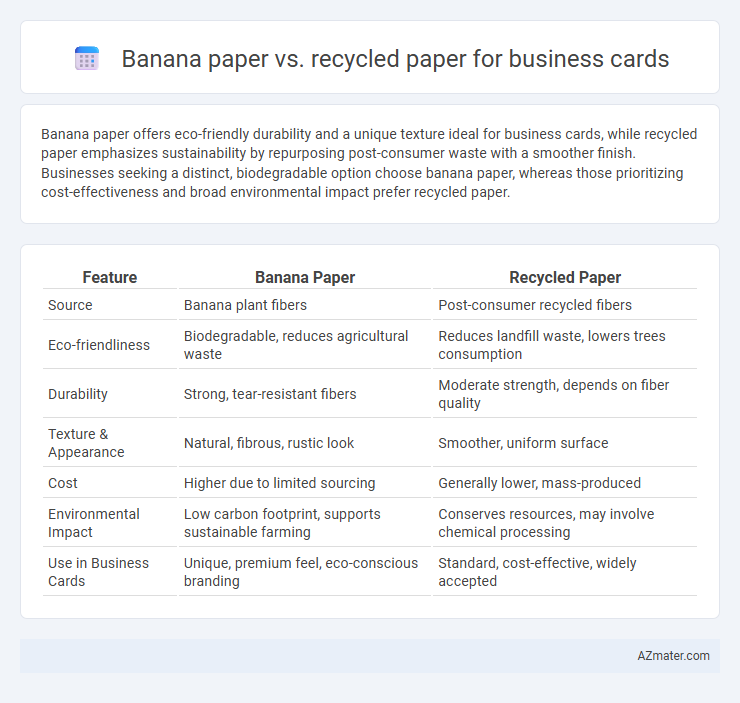Banana paper offers eco-friendly durability and a unique texture ideal for business cards, while recycled paper emphasizes sustainability by repurposing post-consumer waste with a smoother finish. Businesses seeking a distinct, biodegradable option choose banana paper, whereas those prioritizing cost-effectiveness and broad environmental impact prefer recycled paper.
Table of Comparison
| Feature | Banana Paper | Recycled Paper |
|---|---|---|
| Source | Banana plant fibers | Post-consumer recycled fibers |
| Eco-friendliness | Biodegradable, reduces agricultural waste | Reduces landfill waste, lowers trees consumption |
| Durability | Strong, tear-resistant fibers | Moderate strength, depends on fiber quality |
| Texture & Appearance | Natural, fibrous, rustic look | Smoother, uniform surface |
| Cost | Higher due to limited sourcing | Generally lower, mass-produced |
| Environmental Impact | Low carbon footprint, supports sustainable farming | Conserves resources, may involve chemical processing |
| Use in Business Cards | Unique, premium feel, eco-conscious branding | Standard, cost-effective, widely accepted |
Introduction to Sustainable Business Card Materials
Banana paper, made from banana plant fibers, offers a biodegradable and eco-friendly alternative to traditional recycled paper for business cards, emphasizing durability and unique texture. Recycled paper, produced by reprocessing used paper, reduces waste and minimizes environmental impact while maintaining cost efficiency and print quality. Choosing between banana paper and recycled paper for business cards involves weighing factors like sustainability credentials, aesthetic appeal, and production processes.
What is Banana Paper?
Banana paper is an eco-friendly material made from the fibers of banana plants, offering durability and a unique texture ideal for business cards. It is biodegradable, sustainable, and often produced from agricultural waste, reducing environmental impact compared to traditional paper. Unlike recycled paper, which is made from reprocessed paper fibers, banana paper provides a distinctive aesthetic and supports waste reduction in banana-producing regions.
What is Recycled Paper?
Recycled paper is made from used paper products that have been collected, processed, and reformed into new paper, reducing the need for virgin pulp and minimizing environmental impact. It often contains a blend of post-consumer and post-industrial fibers, ensuring sustainability in business card production. Compared to banana paper, recycled paper offers a more conventional texture and finish, but may lack the unique organic appeal and durability associated with banana fiber materials.
Environmental Impact: Banana Paper vs Recycled Paper
Banana paper, made from banana plant fibers, offers a sustainable alternative by utilizing agricultural waste that would otherwise be discarded, reducing deforestation and landfill burden. Recycled paper, produced from post-consumer paper waste, lowers demand for virgin pulp and decreases water and energy usage compared to traditional paper production. Both materials support circular economy principles, but banana paper excels in minimizing chemical processing and promoting zero-waste agriculture practices.
Visual Appeal and Texture Comparison
Banana paper offers a unique visual appeal with its natural fibers creating a subtle, organic texture that stands out compared to the smoother, more uniform surface of recycled paper. The fibrous patterns in banana paper add a tactile dimension, enhancing the sensory experience and making business cards feel more artisanal and eco-friendly. In contrast, recycled paper often has a matte finish with a consistent texture that conveys reliability and professionalism but lacks the distinctiveness of banana paper's earthy aesthetic.
Durability and Quality for Business Cards
Banana paper offers superior durability due to its long fibers, making business cards more resistant to tearing and wear compared to traditional recycled paper. The natural texture of banana paper also enhances print quality and provides a unique, eco-friendly tactile experience that stands out in professional settings. Recycled paper, while sustainable, often has shorter fibers leading to less resilience and can exhibit a rougher surface, impacting sharpness and longevity of business card prints.
Printing Compatibility and Performance
Banana paper offers superior printing compatibility due to its natural fiber composition, allowing ink to adhere crisply without smudging, making it ideal for high-quality business cards. Recycled paper, while more environmentally friendly, can sometimes present challenges such as uneven texture and less vibrant ink absorption, which may impact the sharpness and color consistency of printed business cards. Businesses prioritizing premium print performance often choose banana paper to achieve professional visuals with enhanced durability and smooth finishes.
Cost Analysis: Banana Paper vs Recycled Paper
Banana paper generally incurs higher production costs due to the specialized extraction and processing of banana fibers, resulting in a price range of $0.15 to $0.30 per sheet compared to recycled paper, which costs approximately $0.05 to $0.12 per sheet. While banana paper offers unique durability and eco-friendly appeal, recycled paper provides a more cost-effective option for bulk business card printing without compromising basic quality. Businesses aiming for budget-friendly scalability often prefer recycled paper despite the premium aesthetic value associated with banana paper.
Branding and Eco-Friendly Perception
Banana paper for business cards enhances brand identity through its unique texture and natural fibers, signaling innovation and sustainability to clients. Its eco-friendly perception stems from using agricultural waste, reducing deforestation and carbon footprint compared to traditional recycled paper made from post-consumer waste. Choosing banana paper aligns brands with environmental responsibility while offering distinctive tactile appeal that differentiates their marketing materials.
Conclusion: Choosing the Best Eco-Friendly Business Card Material
Banana paper offers exceptional sustainability with its biodegradable properties and efficient use of agricultural waste, making it a strong candidate for eco-friendly business cards. Recycled paper also supports environmental goals by reducing landfill waste and conserving resources, though it may vary in texture and durability. Selecting the best material depends on balancing environmental impact, print quality, and brand messaging for a truly sustainable business card solution.

Infographic: Banana paper vs Recycled paper for Business card
 azmater.com
azmater.com